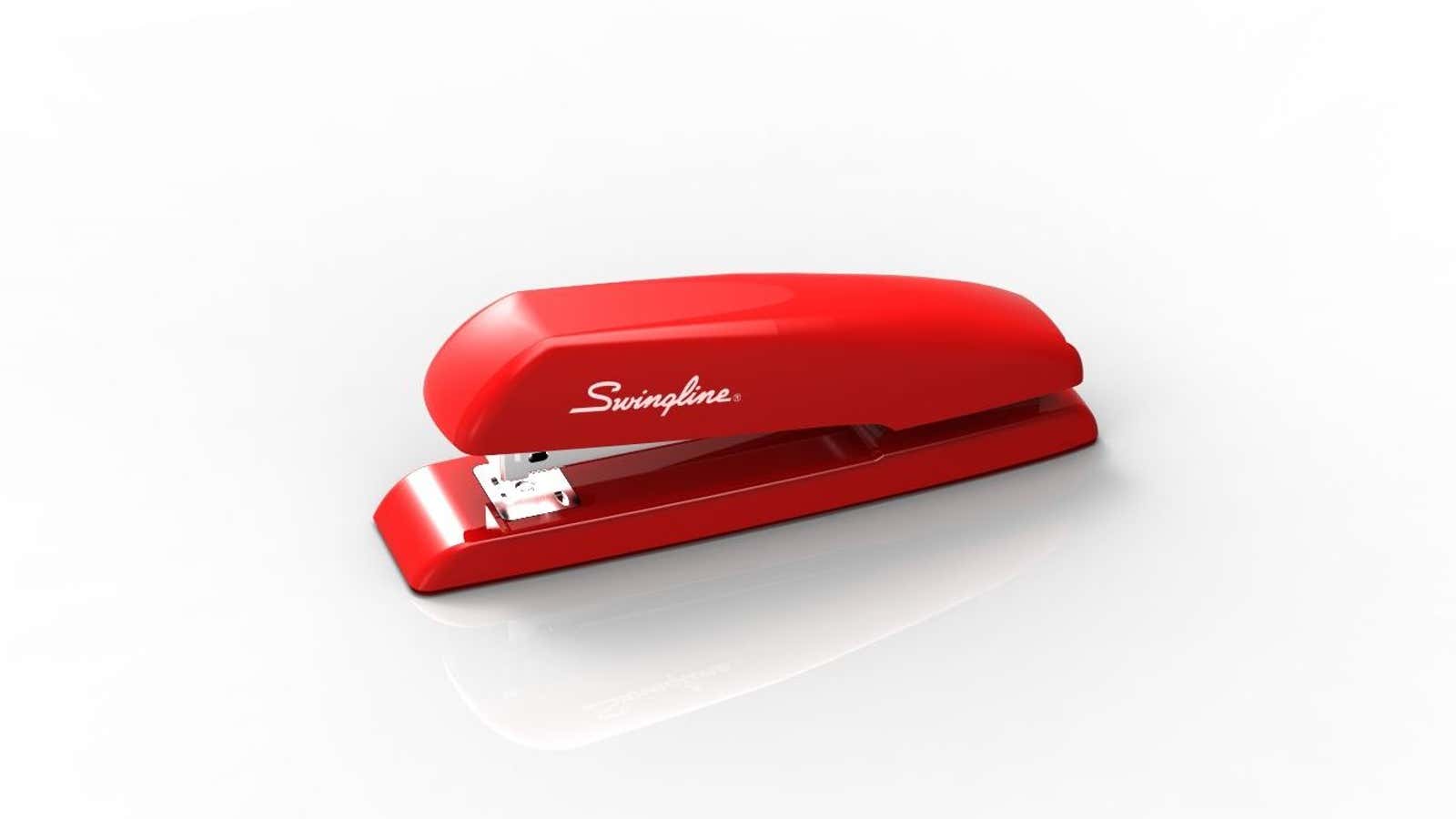The film Office Space turned 20 this year. The movie created a vocabulary that transformed things people loathed at work into things they could laugh at: the “PC load letter” error message; “Did you see the memo?”; the precise pitch of a “yeah” that really means “no.”
While its catchphrases still echo around many an open-plan office (who knew we’d someday pine for the relative privacy of Initech’s gray cubicles?) the film changed one US company possibly more than any other: Swingline, manufacturer of pencil sharpeners, shredders, three-hole punchers, laminators, and—crucially—staplers.
Before Office Space, the 94-year-old office supply company’s fame was confined mostly to the small world of stapling enthusiasts. Its 1939 invention of a top-opening stapler “revolutionized the stapling industry,” according to the company website, but even that achievement didn’t quite make the brand a household name.
While Swingline was diligently turning out office supplies, screenwriter and filmmaker Mike Judge was in the process of directing his first live-action feature film, a satire of the most soul-crushing aspects of the workplace. For veracity’s sake, producers wanted a real-life office supply company to lend its name to a key subplot involving a mumbling, bumbling employee named Milton and his beloved red stapler.
Bostitch said no. Boston said no. So producers turned to one of the last big names in stapling—Swingline, a division of ACCO Brands.
“Swingline was the only company that didn’t object,” Judge told The Ringer website in an oral history of Office Space.
One problem: Swingline only made staplers in gray and blue. Milton’s stapler needed to pop on the screen. A production designer painted it red, tweaked the shape with putty, and the most famous stapler in movie history was born.
Released in theaters on Feb. 19, 1999, Office Space was initially a box-office bust. On VHS and Comedy Central airings, however, its cult audience started to grow.
Gary Cole, who played boss Bill Lumbergh, told the Ringer he realized the movie had found its niche a year after its release, when people starting shouting “Did you get the TPS report?” daily on the streets of Chicago.
Meanwhile, 40 miles from Chicago, at the Lake Zurich, Illinois, offices of Swingline, the marketing department became aware of the movie’s success after noticing a perplexing spike in customer requests for red staplers and a glut of counterfeit red Swinglines on the internet.
When the film was first released, Swingline declined to license any official merchandise. The f-bombs and sex jokes of an R-rated film didn’t quite fit the image of a staid Midwestern office supply company.
Furthermore, the Swingline stapler that appears in the film is no hero. It isn’t there so that the characters can marvel at its durability and superior stapling performance. It’s a bright red totem of despair. When Milton loses his grip on his stapler, he loses it on everything else. There was a reason Bostitch said no.
Once the size of the movie’s cult following became apparent, though, Swingline leaned into Office Space. To its credit, the company managed to take the most alienated character in a film about white-collar misery and turn him into a team mascot.
Quotes from the movie adorn fridge magnets in the Swingline offices, senior marketing manager Tess Hardy tells Quartz at Work. There are winking references to movie dialogue on the Swingline website, where the 747 stapler has been available for purchase in Rio Red for years. And every new US Swingline employee receives a red stapler on their first day.
Red staplers are now the company’s second-best selling product, after the 747 in standard black, and it’s offering a replica of Milton’s prop stapler in honor of the film’s 20th anniversary. (The ad copy for that version includes the classic Milton line: “Have you seen my stapler?”)
“The Milton character resonated so well with many of us,” Hardy said. “He pointed out all of the quirky dynamics within the office environment, from [the person] who misses a cake slice at a birthday celebration, to ownership people feel about their office products.”
Of course, it’s easy for Swingline to see that now. But imagine how much tougher that would be if the company made fax machines.
